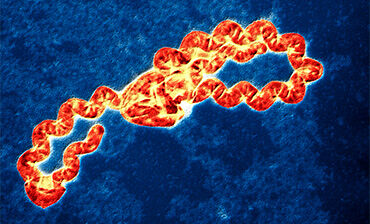Leptospirosis

Leptospirosis is a widespread disease caused by leptospires and that can be transmitted between animals and humans. It is a two-phase illness: the first phase lasts 4-9 days and presents flu-like symptoms such as:
- headache
- chills
- muscle aches
- vomiting
In the second phase, the most common symptoms are:
- fever
- yellowing of the skin
- abdominal pain
- diarrhoea
Severe cases may present organ failure.
In Europe, leptospirosis is mainly found in the Mediterranean and Eastern European areas.
Key facts
Risk for people
The incubation period lasts on average 7-10 days but can be up to 30 days. The disease can be mild to severe and can lead to life-threatening complications such as severe pulmonary haemorrhage (bleeding in the lungs). If untreated, recovery may take several months.
The main groups at risk are those who work with animals: farmers, veterinarians and sewage workers. Outbreaks are also observed among people engaged in recreational water activities. The severity of cases is associated with aging and poor physical condition.
How it spreads
Leptospires that cause illness are found in the kidneys of many animals and are released into the environment through urine. Normally, people get the disease when they come into contact with urine (consumption or inhalation).
Transmission can occur through chapped skin and mucous membranes of the eyes, nose and mouth.
Vaccination and treatment
Vaccination is available in a limited number of countries but is currently not considered a generally applicable option.
Early diagnosis is essential for the treatment of this disease. In less severe cases, oral antibiotics can be administered. In severe cases, large doses of penicillin are recommended.
Protective measures
Transmission can be prevented by
- wearing protective clothing and raising awareness of the risks of the disease
- controlling rodent populations and vaccinating or treating domestic animals that may become infected
- ensuring adequate water and food storage conditions.






